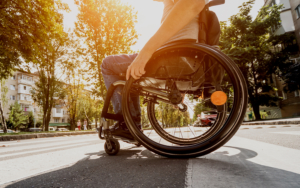
A law that people know well, the Americans with Disabilities Act (ADA), was passed by Congress more than three decades ago. Now, however, it has moved to center stage in the public arena because of the Bipartisan Infrastructure Law (BIL). A significant portion of the massive funding bill is specifically earmarked for ADA compliance projects, but federal funding allocations for ADA compliance may not be the most significant fact to know.
A more important alert is that the federal government, through the infrastructure bill, will aggressively push ADA compliance. Public officials at all jurisdictions of government either realize, or soon will understand, that certain conditions attached to the $1.2 trillion in the Bipartisan Infrastructure Law (BIL) may withhold funding if ADA requirements are not met.
A sum of $1.75 billion in competitive grants from the BIL will provide funding to state or local governments for ADA compliance at stations along legacy rail fixed guideway systems. At the same time, local public entities violating ADA compliance can be fined $75,000 for their first incident and $150,000 for any additional ones.
Baton Rouge Parish officials have allocated $10 million for an ADA transition program designed to deliver a more accessible transportation network to citizens and visitors. Project managers say that solicitation documents will be issued in the second half of 2022 and various ADA improvements will be included. Sidewalks, ramps, crosswalks, and other areas will be upgraded to make movement easier for all pedestrians.
The state of Nevada recently updated its ADA Transition Plan which details numerous upcoming projects. The state’s Department of Transportation (NDOT) will oversee the plan, which includes $9.3 million for ramp and sidewalk improvements. One $4 million project will be launched soon, and a $16.4 million project to carry out additional ramp and sidewalk improvements will be launched in 2024.
The city of Sedro-Woolley, Washington, has announced a plan that includes removing public right of way barriers for a projected cost of $6 million. Other ADA compliance projects are scheduled to begin in 2023 and potentially continue until 2026. At least 441 curb ramp and blended transition barriers are currently in violation of ADA mandated standards.
Washington’s statewide ADA plan carries a projected cost of $35 million. Much of the funding is earmarked for improving ADA compliance in the layout of the state’s highway system. Cities within the state have announced ADA compliance projects as well. Gig Harbor, Washington, unanimously approved an ADA transition plan that will cost over $6 million. The plan entails work on 416 municipal sites that have been identified as failing to meet ADA compliance. Over the remaining months of 2022, work will begin on curb improvements.
ADA projects will begin in 2022 in Minnesota with funding coming from various sources. The governor’s capital budget authorizes $5 million in general obligation funds for pedestrian curb ramp upgrades and signal modifications for the city of Minneapolis. State coffers will cover the remainder of the project’s estimated $10 million cost.
State leaders in Minnesota have announced plans for numerous ADA transition projects. Allocation of $12 million in funding is programmed to begin the first phase of ADA transition work at the Como Park Zoo & Conservatory in St. Paul. Another $15 million project will address ADA accessibility at the Bloomington Ice Garden.
The state of Oklahoma will also offer many contracting opportunities related to ADA transition projects. One of the first initiatives will begin at the state’s School for the Deaf. Upgrades will include replacing narrow and rugged walkways with ADA-compliant sidewalks throughout the campus and creating a vehicular access point for the campus’ outdoor classroom. The estimated $8 million effort will also include construction of a new 40,000 building for classrooms and office space which will be ADA compliant.
In New York, the city of Schenectady will construct a 680-foot public dock that will include an ADA-compliant rampway that connects to a popular pedestrian trail. In January, the Schenectady Metroplex Development Authority approved funding for the engineering and design phases of the project. Construction of the dock is expected to cost $2 million and begin in 2023.
City leaders in New Albany, Indiana, have announced a $3 million initiative to remedy ADA deficiencies throughout the city. Work will include the repair of deteriorating pavement walkways. Construction at several locations designated in the plan will begin in the summer of 2022.
These examples of ADA related projects are only a fraction of the projects that have been announced throughout the country. Now that historic levels of federal funding require ADA compliance, cities and states are launching accessibility projects with unprecedented urgency.
